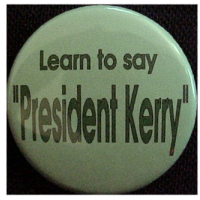Big Bucks Campaign Spending Can Cause Voters to Choose Candidate Who Doesn’t Represent Their Beliefs
 (photo: collectorsarchive.us)
(photo: collectorsarchive.us)
A new political research study contends that heavy campaign spending can sway a significant share of voters to cast ballots for candidates who do not represent their beliefs.
Georgia State University Professor Sean Richey studied elections from 1972 to 2004 and compared voters’ political and ideological beliefs with who they actually voted for. If a voter chose the candidate whose positions differed most from the voters’ positions, the voter was deemed to have voted “incorrectly.”
Richey concluded that campaign advertising convinced 13.6% of voters to “incorrectly” support Republicans for president and 8.7% to “incorrectly” vote for Democrats.
According to Richey, these “incorrect” votes changed the results of three of the nine presidential elections he studied. If all voters had chosen the candidate who most reflected their own beliefs, Gerald Ford would have defeated Jimmy Carter in 1976, Al Gore would have defeated George W. Bush in 2000 and John Kerry would have beaten Bush in 2004.
“These results suggest that the Republicans’ financial advantage gave them the purchasing power to create persuasive campaigns that disproportionately brought incorrect votes to the Republican side,” wrote Richey. “As the Republican advantage in campaign resources grew, their share of incorrect voting grew.”
-Noel Brinkerhoff, David Wallechinsky
To Learn More:
Did Campaign Spending Buy Bush the 2000 and 2004 Elections? (by Lee Drutman, Sunlight Foundation)
Random and Systematic Error in Voting in Presidential Elections (by Sean Richey, Political Research Quarterly) (pdf)
- Top Stories
- Unusual News
- Where is the Money Going?
- Controversies
- U.S. and the World
- Appointments and Resignations
- Latest News
- Trump Renames National Football League National Trump League
- Trump to Stop Deportations If…
- Trump Denounces World Series
- What If China Invaded the United States?
- Donald Trump Has a Mental Health Problem and It Has a Name






Comments